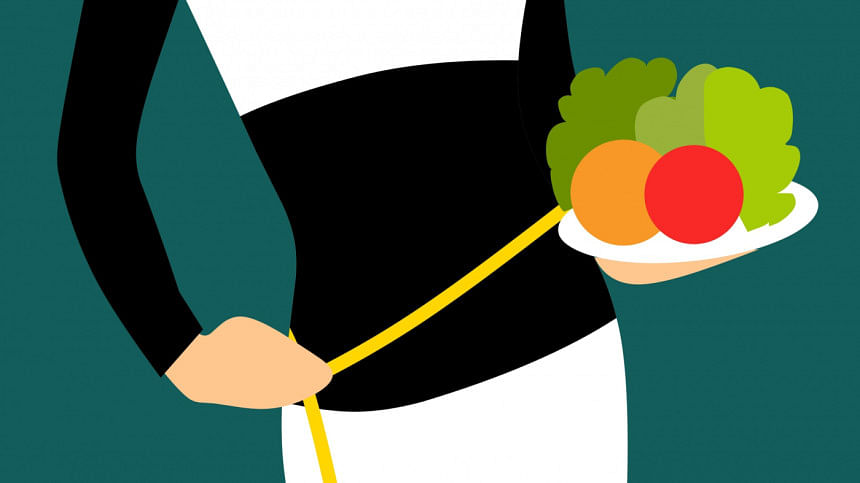Ways to shed pounds after 40

It might be difficult to lose weight after the age of 40. Slowing metabolism and a decrease in daily physical activity can lead to weight gain if these biological changes are not matched with a corresponding reduction in dietary calories. Still, shedding pounds after age 40 is not a hopeless endeavour. Here are a few ways to tackle mid-life weight loss.
Age matters
Over the 40s, may find it easier to gain weight and harder to lose it. Changes in activity, diet, hormones and fat storage can all have a role. But a few simple steps may help you slim down.
Eat your fruits and veggies
Halve your plate at each meal. Green produce has more nutrients and less fat and calories than meat, dairy, or grains. It may help you feel full when eating less. Apples and berries replace high-fat or high-sugar snacks.
Do not skip breakfast
Oatmeal or whole wheat toast with fruit is recommended for breakfast. It can curb midmorning hunger that leads to unhealthy grab-and-go or lunch overeating. Small meals or snacks every few hours can control your appetite.
Eat less at night
If you consume most of your daily calories before 3PM, you may lose more weight than if you eat a large meal later. But what you eat is still more important than when you eat it.
Cook healthy meals
A lot of extra fat and calories can come from the way you prepare food. Instead of frying, baking, or broiling food. Avoid indulging in fried and creamy foods.
Do not make a second trip
As you age, you become less active and need fewer calories. To lose weight, reduce your calorie intake. A food diary or app can help you track calories and eat less.
Pay attention
When you are busy with work, children, and life, you may be tempted to eat on the go or multitask. If you do not focus on your food, you will soon overeat and be hungry again. At mealtime, focus on your plate, not your TV or computer. This helps your brain recognise fullness.
Lay off the soda
Switch to water if you drink sugar-sweetened coffee, tea, soft drinks, or energy drinks. Your sugary drinks can cause weight gain and diabetes.
Cut back on alcohol
Not all beer bellies are alcohol-related. Alcohol can contribute to middle-age "spare tires." A glass of beer or wine has 150 calories, which adds up quickly. Plus, alcohol makes you hungry, so you may eat more.
Make time for exercise
Many 40-somethings don't have time to exercise between desk jobs, commuting, and family activities. At least 2½ hours of moderate physical activity (such as brisk walking or light yard work) is crucial for weight and health. Prioritise calendar times.
Build muscle
Following age 40, people lose muscle naturally, especially women after menopause. Because muscle consumes more calories than fat, it can decrease your metabolism and make losing weight more difficult. Lifting weights or performing body-weight workouts such as push-ups and squats at least twice a week might help you keep those muscles.
Relax, do not stress
Stress might increase your tendency to overeat unhealthy foods and make it more difficult for your body to break down fat. Yoga, deep breathing, meditation, going on a stroll, or reading a good book are all good options. Everyone's stress reduction needs are different, so figure out what works best for you.
Get good sleep
After the age of 40, a variety of factors can disrupt your sleep, including health issues, stress, drugs, and, for women, menopause. On the other hand, people who do not get enough sleep are more prone to acquire weight. If you do not get enough sleep because you are too busy or anxious, attempt to adjust your behaviours and get into a pattern.
Have your thyroid checked
If you eat well and exercise consistently but still cannot lose weight, your thyroid may be malfunctioning. This affects roughly 5 percent of the population, with women and persons over 60 being the most vulnerable. It can induce weariness, joint or muscular discomfort, and depression, in addition to weight gain. Medications can assist, so get it tested if you suspect there is a problem.
Get support
Many people find that losing weight with others is easier than losing weight alone. For example, you may enter a weight-loss contest at work, join a social media group, or invite a friend to join you for early-morning walks or gym courses. Other people who share your goals can hold you accountable and encourage you as you improve.
If you are having trouble meeting your weight-loss goals after age 40, a careful observation of lifestyle and consideration of the above list can help towards losing weight in your 40s.

 For all latest news, follow The Daily Star's Google News channel.
For all latest news, follow The Daily Star's Google News channel. 








Comments